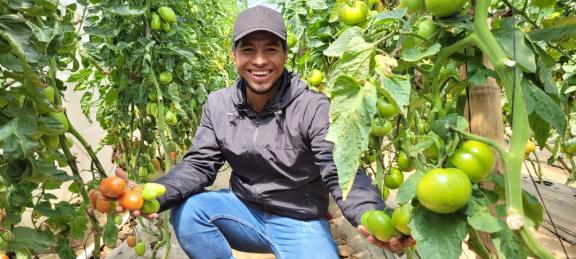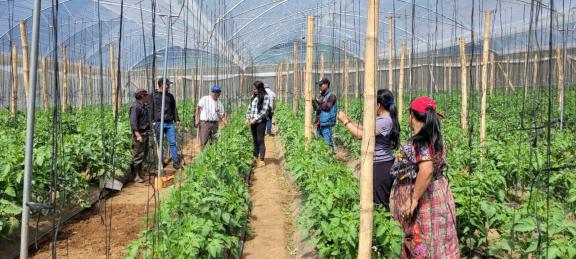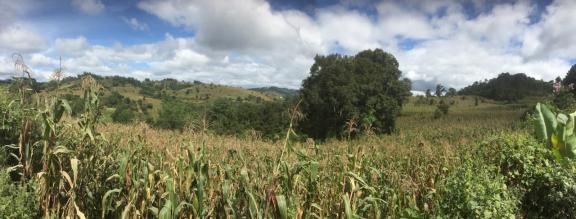A group of 30 young people in San Juan Comalapa, Guatemala, leverages sustainable agriculture and indigenous knowledge to help the local community adapt to climate change.
The changing climate is drastically affecting ecosystems in the Guatemalan highlands resulting in hydrological cycle changes, increases in invasive species, and unprecedented effects on agricultural land. These changes are resulting in a lack of employment and an increase in migration, particularly for communities who depend on farming for their livelihoods.
In partnership with the International Union for Conservation of Nature (IUCN), the “Building livelihood resilience to climate change in the upper basins of Guatemala’s highlands,” or Resilient Highlands project, worth USD 37.7million (USD 22.2 million in GCF financing), aims to tackle these issues, head on.
The Association Producers of Comalapa (ASPROC), a grassroots organisation working with GCF and IUCN, is implementing a small-grants programme that focuses on education and training activities for indigenous youth, as well as sustainable agricultural activities. The programme sources opportunities for young people in San Juan Comalapa to obtain an income, avoid migration, and adapt to climate change.

The project provided Cristian Giovany Caná Simón and other young people in San Juan Comalapa with an opportunity to help their community combat climate change. Photo: ASPROC
“With the economic resources obtained, the young people support themselves to pay for their academic training. Two of them were able to continue their primary level studies; six are in secondary school; fifteen in high school level (higher secondary); and seven are now in university studies”
The project also prevented young people from migrating from their community by providing a source of work and income “providing daily food for their families and generating work to avoid migration and family disintegration”, adds Caná.
It all started in November 2021, when ASPROC initiated activities for agricultural production based on ancestral knowledge, including the use of organic fertilisers and the collection of microorganisms and native plants from local forests, such as quequestle, bell flower, higuerillo, quilete, horsetail, nopal, rue, corn, chichicaste and flor de muerto. At the same time, a local training program, guided by local expert farmers was created for the application of bio-supplies, to control fungi, bacteria, insects, and nematodes.
Provided with technical and organisational advice, the Mayan youth group worked together to solve difficulties related to pest and disease control and water usage. Through solidarity and teamwork, the group turned towards sustainable agriculture, with an Ecosystem-based Adaptation (EbA) approach for the agronomic management of crops, the use of bio-supplies, and the commercialisation of their products.

The Mayan youth group are contributing to the conservation of the community’s forests Photo: ASPROC
To date, the group built a forest nursery, a plot of native plants, and a large greenhouse for agricultural production spanning over 2,000 square meters (m²). Using greenhouse technologies, 11,330 kilograms of tomatoes per 1,000 m² were produced in the greenhouse, representing an average net income of USD 10,000 per year, which covers the annual basic expenses of a four-to-five family household.

The project focuses on reducing the impact of climate change on the hydrological cycle of the basins of the Guatemalan highlands. Photo: UICN
The group also consolidated a series of successful agricultural practices in the community, where the management and conservation of the forest stands out as a source of inputs for the manufacture of bio-fertilisers. Forest conservation activities such as water and soil erosion control, provided valuable ecosystem services and reduced the vulnerability of rural territories. This was particularly critical when the costs of agrochemicals increased more than 200 per cent between 2021-2022, highlighting the resilience of the production model during economic fluctuations.
The Mayan youth group recovered indigenous and ancestral practices, which combined with technological knowledge, led to conservation of the community’s forests, better crop production, and enhanced climate resilience all year round.
The project “Building livelihood resilience to climate change in the upper basins of Guatemala’s highlands” is funded by the Green Climate Fund (GCF), the Korea International Cooperation Agency (KOICA), with technical and financial assistance of the International Union for Conservation of Nature, (IUCN) in collaboration with the Foundation for the Conservation of Natural Resources and the Environment in Guatemala (FCG) and Rafael Landívar University. It is being implemented by the Ministry of Environment and Natural Resources (MARN), the Ministry of Agriculture, Livestock and Food (MAGA), the National Institute of Forests (INAB), and the National Institute of Seismology, Volcanology, Meteorology and Hydrology (INSIVUMEH).